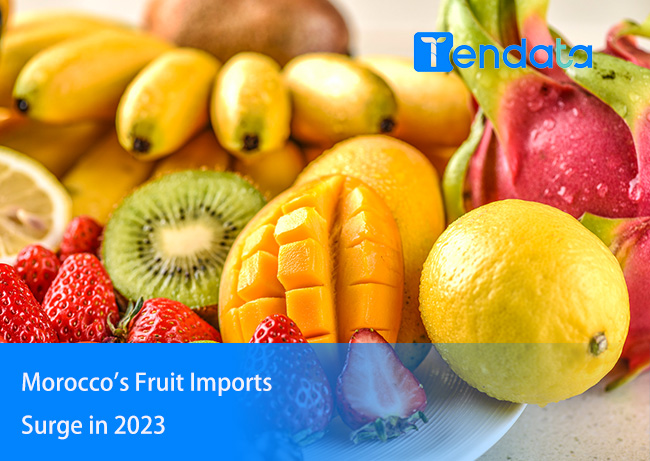 Import News
Import News
 22-03-2024
22-03-2024
Morocco, a major global producer and exporter of fresh fruits, has
consistently held a prominent position among leading suppliers of various fruits
and berries. Despite this, certain fruits in the country still rely on imports,
driven by its unique climatic conditions and domestic production capacity. Let's
review the data from 2023 and explore Morocco's significantly expanded fruit
import landscape from the previous year.
Throughout 2023, Morocco's import volume of fresh fruits soared to an unprecedented 123,000 tons, continuing the upward trend that began in 2020. That year, due to the COVID-19 pandemic and ensuing restrictions, the country saw a significant decline in demand for imported fruits. However, compared to the total import volume of 121,000 tons in 2022, the increase in fruit imports for 2023 was marginal.
A significant shift occurred in 2023, with bananas rising to the forefront of Morocco's fruit imports, reaching a peak of 28,000 tons. Despite Morocco annually producing approximately 350,000 tons of bananas, it still supplements its supply through imports from South American countries, as well as from Spain and Portugal's Atlantic islands. Indeed, these two European countries remain major suppliers of fresh fruits to Morocco, consistently accounting for 40% to 50% of the country's total fruit imports.
Pears, which had dominated the import rankings for five consecutive years, fell to second place. In 2023, their import volume plummeted by 42% to 28,000 tons, significantly below the five-year average level. Morocco's pear imports primarily come from Portugal and Spain, both of which experienced lower production levels due to adverse weather conditions between 2022 and 2023. This scarcity resulted in an overall shortage of pears throughout the European Union.
Mangoes ranked third in Morocco's import hierarchy, with the country's overseas procurement steadily increasing since at least 2017. Morocco's primary mango suppliers come from sub-Saharan Africa and Latin America, including countries such as Mali, Senegal, Burkina Faso, Côte d'Ivoire, Peru, and Brazil.
Avocados followed closely, with import volume surging by 74% in 2023 to reach 13,600 tons. It is noteworthy that Morocco has been expanding avocado exports, even ranking ninth globally in avocado exports in 2022. Due to rapidly growing domestic demand and offsetting the effects of the off-season, Morocco has gradually increased avocado imports, primarily from Peru.
Pineapples ranked among the top five imported fruits in Morocco, with import volume reaching a record-breaking 11,500 tons in 2023, surpassing the ten-thousand-ton mark for the first time. It is noteworthy that 98% of pineapple imports originate from three countries: Costa Rica, Côte d'Ivoire, and Ghana.
Kiwi and apples, ranking sixth and seventh, saw their import volumes decrease to 10,000 tons and 7,000 tons, respectively, in 2023. In contrast, imports of persimmons, watermelons, and plums reached record highs. Last year, Morocco imported 6,700 tons of persimmons and 770 tons of plums (mainly from Spain), as well as 2,200 tons of watermelons (mainly from Mauritania), intended for re-export to EU markets.

We understand that exporters selling Moroccan fruits to other countries often
encounter these difficulties:
1. Not knowing in which country there is higher demand and higher profits for the Moroccan fruits they produce.
2. Contacting many potential buyers online but having no follow-up after the initial communication.
3. Encountering small wholesale quantities and low profits from buyers on Alibaba International Station.
4. Lacking corresponding component exhibitions, unable to directly connect with automobile manufacturers with a large demand for components.
5. The target market is too fragmented, and they do not know how to find suitable buyers.
When exporters encounter difficulties in expanding their markets, it is recommended to obtain Moroccan fruit import data from a reliable import data platform to help with market analysis and pain points, enabling them to find buyers in corresponding markets! Tendata is one of the top import data platforms, solving various difficulties in the export process for you with simple steps.
How to Obtain Moroccan Fruit Import Data?
To find accurate and timely updated Moroccan fruit import data, you can log in to the Tendata platform and use the T-Discovery feature or the T-iTrader feature. By simply entering the product keyword "Moroccan fruits" or the 4-digit prefix of the Harmonized System code for Moroccan fruits and accessories, you can solve your export difficulties through three data sources and 16 reports. Whether it is market analysis or customer acquisition, you can use the insights obtained to make wise decisions.
As a reliable import data platform, Tendata enables global importers and exporters to discover new opportunities, new buyers, and suppliers in real-time updated import data and enter new markets. For 19 years, Tendata has provided excellent service to over 80,000 importers and exporters. Contact us now and get a free demo!
Category
Leave Message for Demo Request or Questions


 T-info
T-info T-discovery
T-discovery

 My
Tendata
My
Tendata Market Analysis
Market Analysis Customer
Development
Customer
Development Competitor
Monitoring
Competitor
Monitoring Customer Relationship
Customer Relationship





































































































































